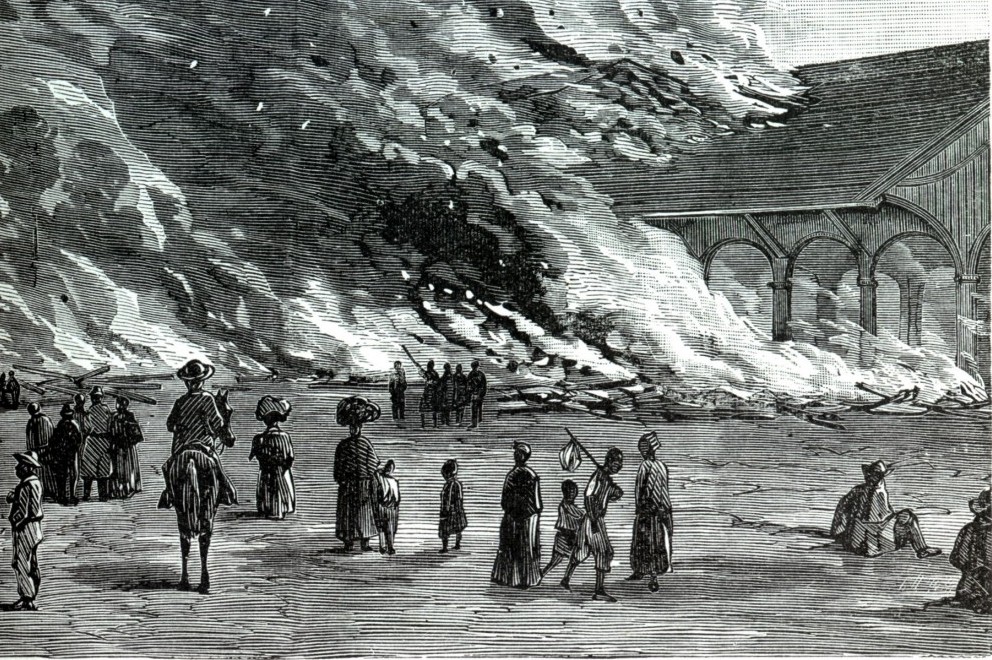I am currently working on completing the index for my forthcoming collection of essays, Interpreting the Civil War at Museums and Historic Sites, which will be published in September. It’s a labor intensive process, but it has given me one final opportunity to read through the manuscript. [You can pre-order the book direct from the publisher at 30% off. Use the code RLFANDF30 at checkout.]
Todd Groce’s chapter on the Georgia Historical Society’s Civil War 150 Historical Markers project explores some of the challenges of re-interpreting the Civil War – specifically Sherman’s March – throughout the state. That there was some controversy involved will come as no great shock, but you may be surprised to learn where some of the push back originated.
This specific example involved the “March to the Sea” marker which was originally located on the grounds of the Carter Center in Atlanta. Here is the marker and text:

What follows is Groce explaining what happened next.
In May 2015, former President Jimmy Carter wrote a letter asking that the March to the Sea marker on the grounds of the Carter Center in Atlanta be either moved or -re-written to reflect a more traditional Lost Cause interpretation. The marker had been approved the previous year by the Carter Center and had been in the ground for seven months when, for reasons unclear to us, we received this letter from President Carter reversing course. Despite a reply letter from GHS citing the extensive scholarly sources used to compose the marker text, President Carter remained firm in his request. With the blessings of the city of Atlanta, GHS relocated the marker to nearby Freedom Park, only a few hundred yards away from its original location, and left the text unaltered. As it turned out, the marker probably is more widely read and more accessible in a busy city park, visited by tens of thousands each year, than when it was located on private property.
With relatively few words this marker certainly packs a punch. References to “Contrary to popular myth…” and the qualification that the destruction Sherman wrought was qualified is no doubt tough to swallow for some, but I still find it difficult to explain President Carter’s response.
I certainly never took him for a Lost Causer. Perhaps someone with influence in the Carter Center pushed him to speak out. Again, I don’t know. But it does highlight that you can never be certain of where to draw those fault lines in our Civil War memory.

Jefferson Davis had his citizenship restored by an act of Congress in 1978 and it was signed by President Carter. I guess he wouldn’t be the first progressive Southern politician who still thought the Confederate leaders were still somehow heroes.
Thanks so much for sharing this piece of history.
I recall reading about Carter bringing Egyptian and Israeli leaders to Gettysburg in 1978. After some tense negotiations at Camp David, he suggested that the attendees take the day off and tour the battlefield 15 miles away. To everyone’s surprise, Egyptian President Sadat and Israeli Defense Minister Moshe Dayan knew the military history of the battle very, very well. Dayan had probably visited before, but not Sadat. Even more astonishing, Israeli Prime Minister Menachem Begin recited the entire Gettysburg Address word-for-word in English – which was not his first language. He learned it to heal rifts within his party in the mid-1970s. Amazing.
Here’s a brief video:
https://www.youtube.com/watch?v=ef8K2BWjt1g
This is great. Thanks for sharing.
Having read, ‘The Day the Revolution Ended’ which is about the last year of the Revolution in the South, the British/Colonial partisan force was truly a scorched earth campaign. Men and boys were routinely dragged out of cabins and shot, often while insisting on being loyal, all dwellings were torched, etc. In 1864, the men soon came to identify those farms which were way-stations for the human trafficking trade: the barracks-like shanties, numerous wooden posts for ‘disciplining by public scourging’ the array of cast iron devices for confining enslaved persons, and sadly, the packs of dogs..which were butchered. These locales always went up in smoke. As the author of ‘Southern Storm’ pointed out, foraging teams could venture only so far on foot from the column, in time to be back before dark from point to point. They didn’t wait for stragglers and everyone knew the score.
Didn’t know about British/Tory “ethnic cleansing.” Thanks for posting.
I remember he was angry when highs school bands (and such) at rallies played “Marching Through Georgia” explaining that it was NOT a happy song for Georgia.
Do we have any way of knowing what the specific changes were that Carter was looking for?
Will have to ask.
When Jimmy Carter was a boy in Plains, there were still old Confederate veterans around, and I’m sure he met a few. He went to school at a time when the Lost Cause was at its most popular, and Dunning School interpretation in vogue. It doesn’t surprise me at all that vestiges of that carry over to this day. He’s a good man who is, ultimately, the product of his own life experiences.
fascinating anecdote. Perhaps the very elderly former President was holding on to some family legends that don’t fit with the facts referenced in the marker. Doesn’t change my opinion about Jimmy Carter, though.
It is certainly possible.